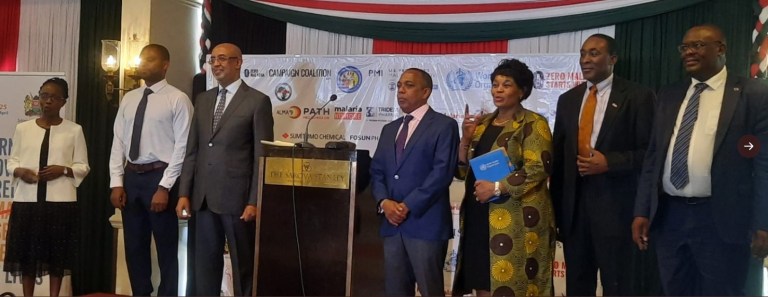Kenya has over the last decade been able to reduce the burden of malaria by at least 50 per cent from a prevalence rate of 11 per cent in 2010 to six per cent in 2020.
Health Cabinet Secretary (CS) Mutahi Kagwe said that this achievement was a result of concerted and sustained effort and collaboration between the Ministry of Health, the County governments, local communities, development partners in health and the global malaria community.
Kagwe said that in the last year, the government provided Ksh 1.2 billion for the procurement of malaria diagnosis and treatment commodities.
In a speech read on his behalf by Health CAS Dr Rashid Aman at a Nairobi hotel on Wednesday during the World Malaria Day media briefing breakfast, Kagwe said that working together with partners, the country registered over 14 million malaria diagnostic tests conducted and five million cases of malaria treated.
“In the prevention of malaria, over 324,000 pregnant women living in malaria-endemic areas of the lake and coast endemic counties received Intermittent Preventive Treatment for malaria during pregnancy,” said the CS.
Kagwe explained that between May and December 2021, 16 million Long Lasting Insecticide Treated Nets (LLIT) were distributed to households in 27 Counties with the highest burden of malaria adding that these nets are providing protection from malaria to an estimated 25 million men, women, pregnant women and children sleeping under these nets every night.
“Further, the Ministry distributed 1.8 million LLIT bednets in 36 counties to pregnant women and children under a year old who are the groups most vulnerable to adverse outcomes of malaria infection,” said Kagwe.
“I am pleased to report that despite the constraints imposed by the Covid-19 containment measures in force then, the bednet distribution campaign achieved 100 per cent coverage,” said Kagwe.
The CS said that the ministry together with county governments continues with its current programme of Indoor Residual Spraying (IRS) of households in Migori and Homa Bay counties offering protection to 2.1 million residents. This programme is likely to be expanded in the near future to other counties in the group of lake endemic Counties.
By Fred Odanga Azelwa.
